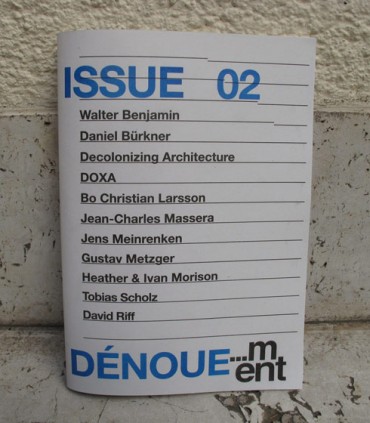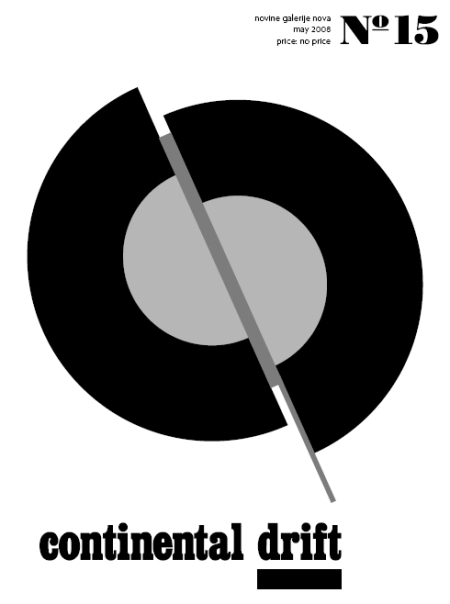…ment: Journal for Contemporary Culture, Art and Politics, 2: Dénouement (2011)
Filed under magazine | Tags: · art, capitalism, catastrophe, labour, politics

“From the financial crisis to natural and man-made disasters via the wave of political extremisms, our times are patterned with catastrophes of all kinds. While the contemporary meaning of catastrophe is commonly associated to the idea of disaster and collective trauma its origin mostly refers to a sudden turn, or a reversal of what is expected. Catastrophe would therefore be this shift that allows us to explore spaces that could not be accessed, whilst breaking with the existing or the normative. Issue 2 of …ment explores the dis-ordering nature of catastrophe whilst celebrating the potential of its narratives and imageries.
…ment is a journal for contemporary culture, art and politics published in irregular intervals. Through a multi-disciplinary set of editorial forms, the journal aims to reflect on current societal issues and debates.”
With contributions by Tobias Scholz, Jean-Charles Massera, David Riff, Daniel Bürkner, Jens Meinrenken, Walter Benjamin, Bo Christian Larsson, Heather & Ivan Morison, Gustav Metzger, DOXA. Also included in the journal is an excerpt Walter Benjamin’s Theses on Philosophy of History. The printed journal includes a special edition by Bo Christian Larsson.
Editor-in-chief: Federica Bueti
Associate editors: Benoit Loiseau, Clara Meister
98 pages
HTML (updated on 2020-10-19)
PDF (added on 2020-10-19)
David Graeber: Revolutions in Reverse: Essays on Politics, Violence, Art and Imagination (2011)
Filed under book | Tags: · altruism, anarchism, anthropology, art, autonomy, capitalism, communism, debt, politics, violence

Capitalism as we know it appears to be coming apart. But as financial institutions stagger and crumble, there is no obvious alternative. There is good reason to believe that, in a generation or so, capitalism will no longer exist: for the simple reason that it’s impossible to maintain an engine of perpetual growth forever on a finite planet. Yet faced with this prospect, the knee-jerk reaction is often to cling to what exists because they simply can’t imagine an alternative that wouldn’t be even more oppressive and destructive. The political imagination seems to have reached an impasse. Or has it?
In this collection of essays David Graeber explores a wide-ranging set of topics including political strategy, global trade, debt, imagination, violence, aesthetics, alienation, and creativity. Written in the wake of the anti-globalization movement and the rise of the war on terror, these essays survey the political landscape for signs of hope in unexpected places.
At a moment when the old assumption about politics and power have been irrefutably broken the only real choice is to begin again: to create a new language, a new common sense, about what people basically are and what it is reasonable for them to expect from the world, and from each other. In this volume Graeber draws from the realms of politics, art, and the imagination to start this conversation and to suggest that that the task might not be nearly so daunting as we’d be given to imagine.
Publisher Minor Compositions, an imprint of Autonomedia, November 2011
ISBN 1570272433, 978-1-57027-243-1
120 pages
PDF (PDF; updated on 2012-8-26)
PDF (EPUB; added on 2012-8-26)
PDF (MOBI; added on 2012-8-26)
View online (Scribd.com)
Continental Drift Zagreb (2008)
Filed under newspaper | Tags: · activism, art, autonomy, capitalism, cartography, creative industries, economy, geopolitics, neoliberalism, politics, power, war

“It’s always useful to turn dreams into realities, because you get to measure the differences and even let yourselves be guided by the intrinsic gaps between the two. Continental Drift was the dream of a geopolitical analysis carried out by a diverse group (theorists, artists, activists) and mapped onto everyday social and political life as an expanding set of explanations and expressive potentials. The dream was made in USA, and even on Wall Street in New York City, but it was realized by a group of immigrants, returning exiles and general misfits, all marked by the basic heresy of left positions in an age of liberal capitalist empire. By transplanting this inquiry to Zagreb, Croatia – the home of the What, How & For Whom? collective – it seems we are bringing a new dream into focus. The desire is that of widening the intrepretative circle, crossing divides of language and historical experience, trying to build capacities of understanding and confrontation between the immigrants, exiles and misfits of the big continental blocs and especially their edges – the cracks that open up wherever anyone can no longer stand what is taken and imposed as the norm. Empire as we see it is always falling apart, for better and usually for worse, under the pressure of massive processes which we are unlikely to even see coming, let alone grasp or have the agency to change in any way. Yet as the urgency and also the absurdity of the present predicament begins to rise in intensity, at least all around there are people trying similar experiments.” (Brian Holmes)
Novine Galerije Nova, No 15, May 2008
Publishers: What, How and for Whom/WHW, Zagreb; AGM, Zagreb
Editors: Continental Drift Zagreb team (Ayreen Anastas, Rene Gabri, Brian Holmes, Claire Pentecost, What, How and for Whom/WHW, Ivet Ćurlin, Ana Dević, Nataša Ilić, Sabina Sabolović)
Design: Dejan Kršić
36 pages

